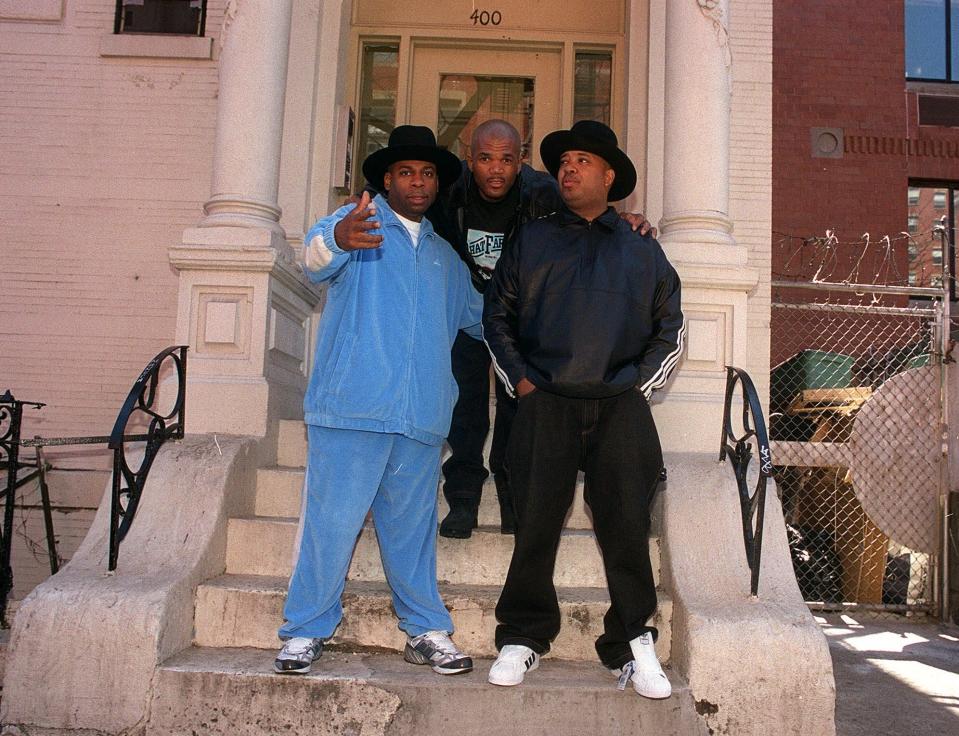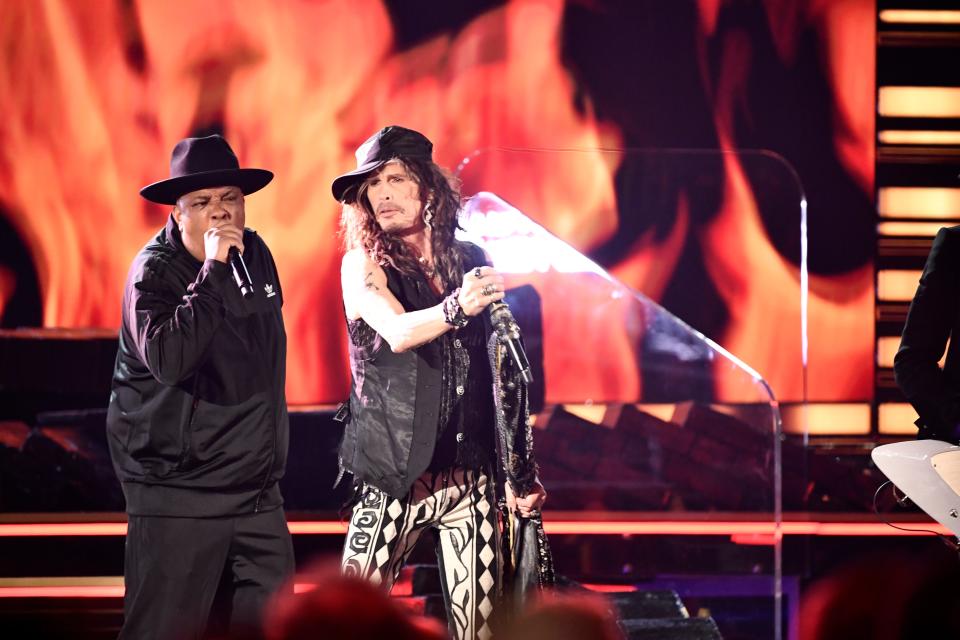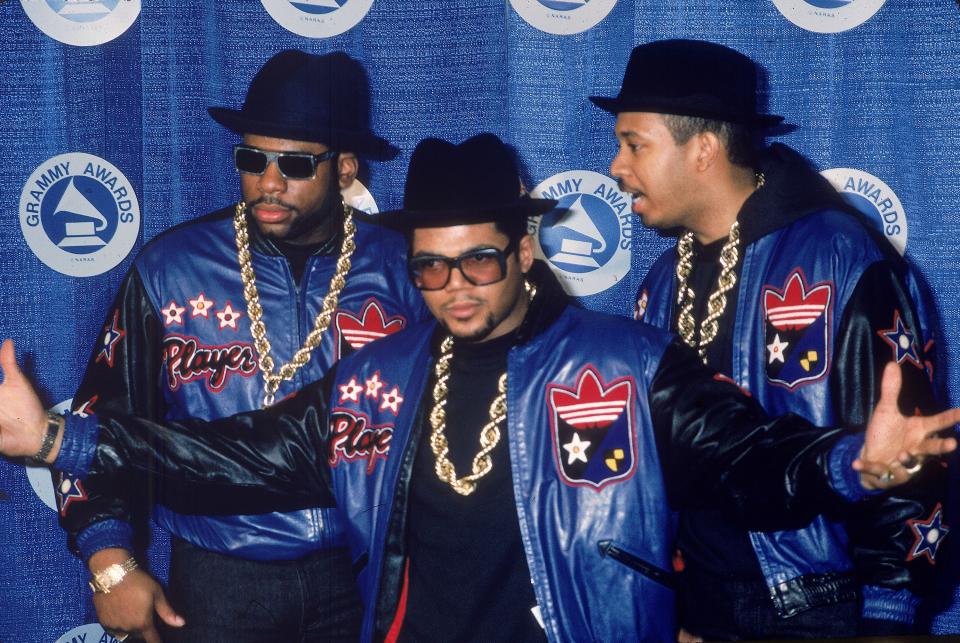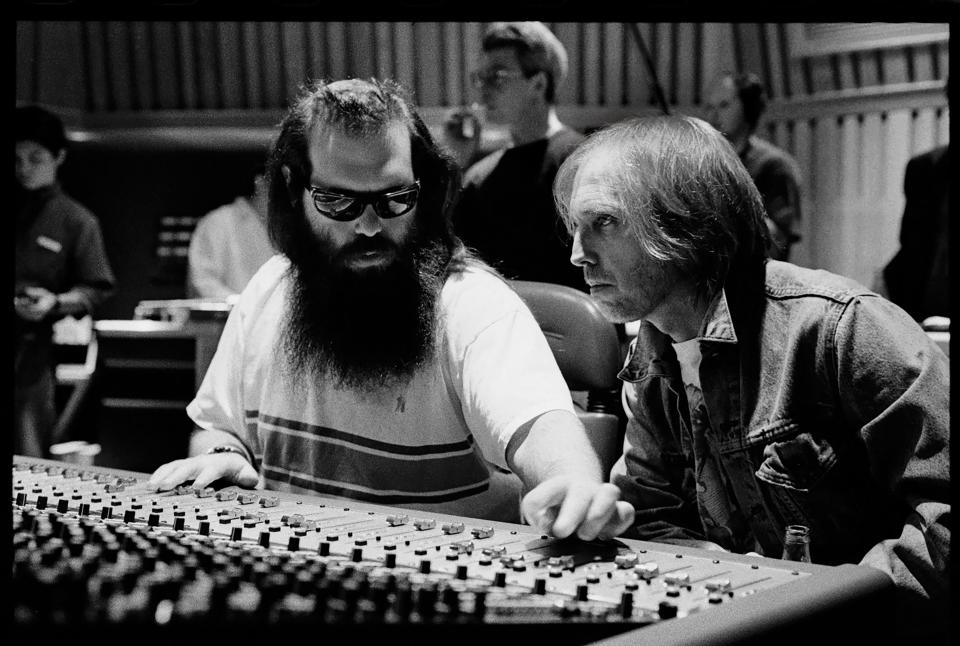Run-D.M.C's 'Walk This Way' brought hip-hop to the masses and made Aerosmith cool again
- Oops!Something went wrong.Please try again later.
As the story goes, one day nearly 40 years ago, a precocious 22-year-old New York record producer named Rick Rubin heard one of his bands, the hip-hop trio Run-D.M.C., messing with a catchy riff on a turntable.
Bom-bah, bah-bom-bom bah.
“You know what that is?” Rubin asked the group, who replied that it was just known in the hip-hop community as The Beat.
“No, that’s Aerosmith’s song, ‘Walk This Way,’” Rubin said. Which generated a look that best translates to: What’s an Aerosmith?
But the song was destined to be a once and future hit, going from a radio staple for the Boston-based rock band in 1975 to a revamped crossover for Run-D.M.C. in 1986.
That summer, the culturally ascendant Run-D.M.C. – Joseph "Run" Simmons, Darryl "DMC" McDaniels and Jason "Jam Master Jay" Mizell (who passed away in 2002) – released their rap-meets-rock collaboration of “Walk This Way" on their hot third album, "Raising Hell."

The mash-up forever changed the lily-white nature of MTV and helped introduce a large swath of white America to hip-hop, a vibe, style and flavor that in the 50 years since its acknowledged debut has embraced and enveloped other genres with inimitable skill.
“Walk This Way” also served as a demarcation point for both groups. It led to a fallow period for the rappers (who headline the 50th anniversary of hip-hop concert at Yankee Stadium Aug. 11) and a soaring rebirth for the rockers (who perform their final concerts this fall).
Rap version of 'Walk This Way' was a favorite on rock radio, ushering new fans to hip-hop
“The reason this song is so important is not because it was Run-D.M.C.’s best song, because it’s not, but because it was played on white rock radio stations all over the country and introduced that sound to a new crowd,” says Geoff Edgers, author of “Walk This Way: Run-D.M.C., Aerosmith, and the Song that Changed American Music Forever.”
Edgers says after “Walk This Way,” Run-D.M.C. stalled a bit, waiting two years to put out their next record, “an eternity in the hip-hop world.” Meanwhile, the revamped song convinced Aerosmith to work with outside writers, which led to their pop metal renaissance with 1987’s “Permanent Vacation.”
“That song also deified Rick Rubin, opening up the door for him to do everything from metal to rap to Johnny Cash,” says Edgers, music writer for the Washington Post. “He’s now seen as a guy who can get the best out of any musician, and the root of that Rick Rubin mythology is his vision for ‘Walk This Way.’”
To watch the video of that version on YouTube is to see a perfect visual metaphor for its impact.
Both bands are rehearsing in adjoining studios, with Run-D.M.C. pounding on a shared wall to get Aerosmith to turn their amps down. When they resist, the rappers decide to play their rapped version of “Walk This Way” even louder.
Eventually, the wall between the two camps is literally broken down and they wind up on a stage together trading verses and riffs.
For Black youths who felt MTV 'wasn't watching me,' the video's popularity was a cultural breakthrough
“I was 12 when it came out on MTV, which I was watching even though the channel wasn’t really watching me as a young Black kid,” says Dion Summers, vice president of programming for SiriusXM radio. “So that was a game changer.”
He says the song also presaged the sort of cross-genre collaboration “you see all the time now, whether it’s Jay-Z and Linkin Park, Nelly and Tim McGraw or Travis Scott and Bad Bunny.”

Summers credits Rubin “for having the foresight to see where rap could go as a genre,” noting the song eventually led to a larger Black and hip-hop presence on the overwhelmingly white MTV. “I remember how fresh it all sounded,” he says.
There was indeed something mesmerizingly seamless in the way the totally distinct vocal performances blended into one sonic sandwich that instantly defined the changing times.
The revamping of 'Walk This Way' seemed unique in 1986, but hip-hop artists had been sampling its riff for years
But the mash-up was, in fact, not novel, says Dave “Davey D” Cook, a hip-hop scholar and professor of Africana Studies at San Francisco State University.
“The dance with white folks had been going for a while before Aerosmith, and it seemed more genuine,” he says. “Before, there was the relationship between hip-hop and new wave and punk, with Blondie, the Clash, the Tom Tom Club. Those acts often asked rappers to come perform at their shows, and if the audience didn’t like them, they’d step to them and say, ‘These are our guys.’”

Cook particularly sites Blondie’s Debbie Harry rapping on the 1980 single “Rapture” as a watershed moment. But, he allows, “that Run-D.M.C. song was a swift kick. People who didn’t know about rap before then started to check it out.”
Edgers says “Walk This Way” had long been a staple of the vinyl-scratching masters before the 1986 Run-D.M.C. effort, with none other than seminal rapper Grandmaster Flash sampling the infectious Perry two-bar opening riff during house parties.
“I’m not even sure Run-D.M.C. knew that ‘Walk This Way’ had lyrics, because hip-hop only cared about that opening,” he says.
Now iconic, the Run-D.M.C./Aerosmith collaboration could easily never have happened
Not that either band had great interest in the collaboration, says Edgers.
“Run-D.M.C. were more concerned with a rental car they had, which they worried had been stolen, and (Aerosmith singer) Steven Tyler and (guitarist) Joe Perry were so drugged out back then I’m not sure they were thinking straight and at most saw it as just a way to get a few bucks,” he says.
In Edgers' oral biography of the song's history, McDaniel says that Rubin gave the group a yellow pad to start writing out the hormonally driven lyrics to "Walk This Way." That almost ended the affair.

"We go down to my basement and put on the record and then you hear 'Backstroke lover always hidin’ ’neath the covers' and immediately me and Joe (Simmons) get on the phone and say: “Hell no, this ain’t going to happen. This is hillbilly gibberish, country-bumpkin bulls---.”
But Rubin persisted and persevered. As unlikely as the musical meet-up between the disparate musicians was, the result was a moment that helped not only Aerosmith’s foundering career but pushed rap into a spotlight that only grew hotter with the decades to come.
“Thank heavens they worked with a good song,” Edgers says with a laugh. “If they’d recorded a lesser song, or if Aerosmith had collaborated with lesser rappers, it would have never been as popular as it was. But it was one of those cosmic organic things that just came together beautifully.”
This article originally appeared on USA TODAY: Run-D.M.C.'s hip-hop take of 'Walk This Way' is the ultimate crossover

